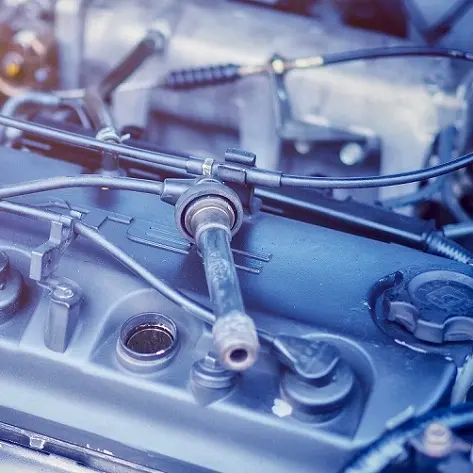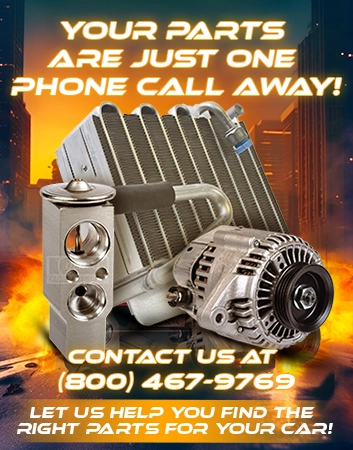Spark plug wires are an integral part of an engine’s ignition system. Without these wires, the electrical spark created by the ignition system would not be able to travel to the spark plug, and an engine would be unable to start.
Spark plug wires are responsible for creating a pathway for the spark to travel from the ignition coil to the spark plug, which then ignites the fuel and air mixture within the combustion chamber. Knowing how to troubleshoot and fix spark plug wires is essential for maintaining a vehicle’s performance. That’s exactly what we’ll cover in this short guide. Let’s get started!

What Are Spark Plug Wires?
Spark plug wires play a crucial role in the operation of the engine’s ignition system by transmitting the high-voltage electrical current produced by the ignition coil to the spark plugs, igniting the air-fuel mixture inside the engine’s combustion chamber.
These wires are typically made from conductive materials like copper or aluminum to enable the free flow of electrical current through them. The insulation, made of rubber or plastic, protects the wires from heat and corrosion.
To accommodate various vehicle models and engine sizes, spark plug wires come in different sizes and lengths. The length of the wires is critical because it determines the resistance in the circuit. Too long wires can cause a weaker spark, while too short wires can cause misfires.
Spark plug wires are connected to the ignition components via terminals and clamps. Brass or other conductive materials are used to make the terminals, which secure the wires to the spark plugs and other ignition components. Metal clamps hold the wires in place and prevent them from coming loose.
If you’re looking for quality spark plug wire sets, check our catalog for quality replacement options.
What Causes Spark Plug Wires to Fail?
There are a few different causes of spark plug wire failure. The most common causes are corrosion, wear and tear, exposure to heat and oil, and damage from external factors.
Corrosion
Corrosion is caused by moisture and can weaken the conductive material in spark plug wires. This can lead to electrical arcing and misfires. Corrosion is most likely to occur in areas with high humidity or in older vehicles that may have been stored for long periods of time.
Wear and Tear
One of the most common reasons why spark plug wires fail is due to wear and tear. Over time, the insulation on the wires can become brittle and cracked, exposing the wire inside to moisture and debris. This can cause the wire to corrode and ultimately fail. The rubber boots that connect the wires to the spark plugs can also become worn, which can cause them to become loose and fall off.
Exposure to Heat and Oil
Another cause of spark plug wire failure is exposure to heat and oil. The engine compartment is a hot and dirty environment, and the high temperatures can cause the wires to become brittle and crack. The oil that can leak onto the wires can also cause the insulation to break down, leading to failure.
Damage from External Factors
Spark plug wires can also fail due to damage from external factors such as physical impact, abrasion, or puncture. If the wires are not routed correctly or are rubbing against other parts, they can become damaged and eventually fail. Rodents can also chew through the wires, causing damage.
Common Symptoms of Spark Plug Wire Failure

Common symptoms of faulty spark plug wires include engine misfires, engine stalling, poor acceleration, and reduced fuel economy. Here’s more about each of these.
Engine Misfires
Engine misfires can occur when the spark plug wires are not functioning properly. This can cause the engine to run rough and can also lead to increased emissions. If engine misfires are present, it is likely that the spark plug wires are at fault.
Engine Stalling
If the spark plug wires are not functioning correctly, the engine may stall or shut off completely. This can be a sign of a faulty spark plug wire. Make sure to inspect the spark plug wires and replace them if necessary.
Poor Acceleration
A faulty spark plug wire can cause the engine to struggle when accelerating. This can lead to a decrease in power and poor performance. If acceleration is poor, it is likely that the spark plug wires are at fault.
Reduced Fuel Economy
If the spark plug wires are not functioning properly, the engine may be unable to take full advantage of the fuel it is being given. This can lead to reduced fuel economy. Poor fuel economy can often be an indicator of faulty spark plug wires.
How to Fix Faulty Spark Plug Wires?
If any of the symptoms of faulty spark plug wires are present, it is best to replace the entire set of spark plug wires. This will ensure that all the wires are functioning properly and that the engine is running at its peak performance.
Replacing the spark plug wires is a relatively simple job and can be done at home in a few steps. Make sure to follow the manufacturer’s instructions and use the proper tools when replacing spark plug wires.
Get Quality Spark Plug Wires at eEuroparts.com!
Spark plug wires are an important part of an engine’s ignition system and without them, the engine would be unable to start. If any of the symptoms of faulty spark plug wires are present, it is best to replace the entire set of spark plug wires in order to ensure that the engine is running at its peak performance.
Here at eEuroparts.com, we offer a wide range of high-quality spark plug wires made by some of the best brands in the industry. To find a product that matches your car, head over to our shop, select your vehicle using the drop-down menu, and you’ll find parts that are guaranteed to fit your car.



